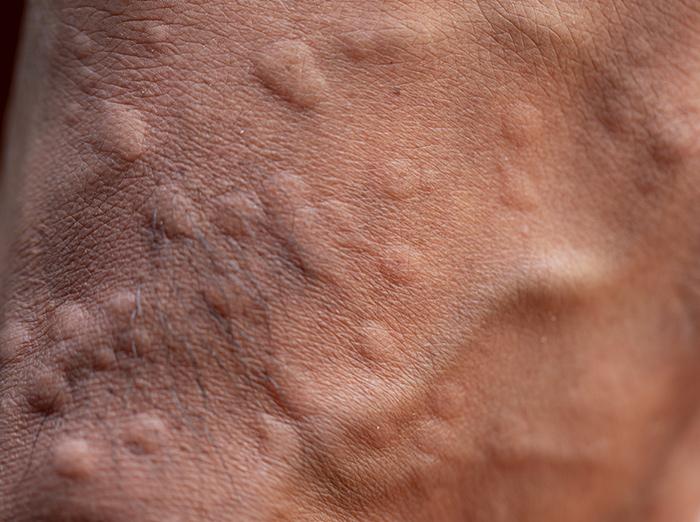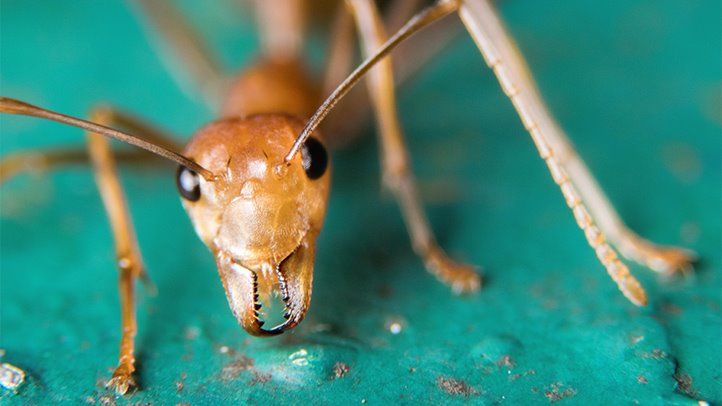Ants bite to defend themselves or communicate through pheromones, injecting formic acid that causes irritation and pain. Ant bites can be a common nuisance, especially during outdoor activities or when encountering ant colonies in homes or gardens.
Understanding why ants bite can help in avoiding such unpleasant encounters. From the tiniest thief ants to the larger carpenter ants, these insects have developed biting as a defense mechanism or a means to warn intruders or predators. The severity of ant bites can vary depending on the ant species, with some causing mild irritation and others potentially triggering allergic reactions in sensitive individuals.
By learning about ant behavior and habitats, one can take proactive steps to prevent being bitten and minimize any discomfort associated with these tiny but formidable creatures.

Credit: www.terminix.com
The Science Behind Ant Bites
Ants are tiny creatures that often go unnoticed, but their bites can cause discomfort and sometimes even pain. To understand why ants bite, we must delve into the fascinating science behind their behavior. From their anatomy to their defense mechanisms, each aspect plays a crucial role in their biting habits.
Ant Anatomy And Defense Mechanisms
Ants are incredibly intricate creatures, with unique anatomical features that enable them to bite. Let’s take a closer look at their anatomy and defense mechanisms:
| Ant Body Part | Description |
|---|---|
| Ant Mandibles | The mandibles are like jaws, powerful enough to break through human skin and deliver a bite. |
| Ant Venom | Some ants possess venom glands, which inject toxic substances into their victims when they bite. |
| Ant Pheromones | Pheromones are chemical signals that ants release when they bite, alerting other ants to potential threats. |
As we can see, ants have specialized mandibles and venom glands that aid in their biting abilities. Additionally, their utilization of pheromones ensures their fellow colony members can react swiftly to potential danger.
How Do Ant Bites Occur
Ant bites occur when ants perceive a threat or feel provoked. Understanding the circumstances that lead to ant bites can help us prevent unwanted encounters. Here’s how ant bites occur:
- Provocation: Ants usually bite when they feel their colony or themselves are in danger. Stepping on an anthill or disturbing their nests can trigger an aggressive response.
- Defensive Behavior: Some ant species exhibit extraordinary defensive instincts, and they bite as a means of protection. Their tiny size makes biting their primary line of defense.
- Chemical Signals: Ants release pheromones that communicate threats to other ants. When one ant bites, these chemical signals attract other members of the colony to defend themselves against the perceived danger.
By understanding the triggers for ant bites, we can take precautions and avoid situations that might lead to these unwanted encounters. Ultimately, respecting the ants’ habitats helps maintain a harmonious coexistence with these remarkable creatures.
:max_bytes(150000):strip_icc()/FireAntBite-9f9561b55155424b997d2bbb6cbccc7a.jpg)
Credit: www.health.com
Types Of Ants And Their Biting Behavior
Types of Ants and Their Biting BehaviorIdentifying Ant SpeciesIdentifying Ant Species
Ant species vary in size, color, and behavior.
Understanding Ant Biting PatternsUnderstanding Ant Biting Patterns
Ants bite for defense, food, and territorial reasons.
Types of Ants and Their Biting BehaviorIdentifying Ant SpeciesIdentifying Ant Species
Ant species vary in size, color, and behavior.
Understanding Ant Biting PatternsUnderstanding Ant Biting Patterns
Ants bite for defense, food, and territorial reasons.
Health Impact Of Ant Bites
Ant bites can have adverse effects on human health. Proper understanding of the health impact of ant bites is crucial for prevention and treatment.
Potential Health Risks
Ant bites can result in:
- Swelling and redness
- Intense itching and discomfort
- Allergic reactions in some individuals
- Potential infection if not treated promptly
Seek medical attention if:
- The affected area becomes increasingly swollen or painful
- You experience signs of an allergic reaction
- There is pus or worsening redness at the bite site
Treatment For Ant Bites
- Wash the affected area with soap and water
- Apply a cold compress to reduce swelling
- Use over-the-counter antihistamine cream to alleviate itching
- Oral antihistamines can help with allergic reactions
| Do not scratch the bite area |
| Avoid applying irritants like vinegar or alcohol |
| Monitor for signs of infection and seek medical help if necessary |

Credit: www.millerthekiller.com
Preventing Ant Bites
If you’ve ever experienced the discomfort of an ant bite, you know how pesky and painful these tiny insects can be. Fortunately, there are effective methods to avoid ant encounters and prevent those itchy bites that can ruin your day. By taking simple precautions and using natural repellents and household solutions, you can keep ants at bay and enjoy a bite-free environment. Let’s explore some of these strategies:
Methods To Avoid Ant Encounters
When it comes to preventing ant bites, the best approach is to minimize the chances of encountering these unwelcome visitors. Here are a few methods to help you avoid ant encounters:
- Maintain cleanliness and hygiene:
- Keep your living space clean and free of food debris.
- Properly store food:
- Store food in airtight containers or the refrigerator to deter ants from being attracted to the scent.
- Seal cracks and crevices:
- Seal off any potential entry points for ants, such as cracks in walls or gaps around windows and doors.
- Remove outdoor attractants:
- Trim vegetation and remove any fallen fruits or debris that may attract ants.
Natural Repellents And Household Solutions
If you find yourself needing an extra layer of protection against ants, natural repellents and household solutions can be a great way to ward them off. Here are some effective options to consider:
- Citrus peels:
- Place citrus peels, such as lemon or orange, near areas where ants commonly appear. The strong scent deters ants from entering.
- Vinegar:
- Mix equal parts of vinegar and water in a spray bottle. Spray this solution along ant trails or entry points to repel them.
- Cinnamon:
- Ants dislike the strong smell of cinnamon. Scatter cinnamon powder near ant-infested areas to discourage them.
- Mint leaves:
- Crush fresh mint leaves and place them in areas prone to ants. The strong aroma acts as a natural deterrent.
- Boric acid:
- Make a solution of boric acid and sugar, and place it in areas where you suspect ants to be. They will be attracted to the sugar but then be eliminated by the boric acid.
By implementing these methods and utilizing natural repellents and household solutions, you can significantly reduce the chances of encountering ants and prevent those annoying and painful bites. Remember, prevention is the key to a bite-free environment!
Frequently Asked Questions On Why Does Ant Bite
Why Do Ants Bite Humans?
Ants bite when they feel threatened or in defense. The bites can be painful due to the formic acid released by the ant. It’s their natural defense mechanism, so it’s best to avoid disturbing their colonies.
Can Ant Bites Cause Allergic Reactions?
Yes, some people may experience allergic reactions to ant bites, leading to symptoms like swelling, redness, itching, and in severe cases, difficulty in breathing. It’s essential to seek medical attention if you suspect an allergic reaction to an ant bite.
How To Treat Ant Bites?
Clean the affected area with soap and water, apply a cold compress to reduce swelling, and avoid scratching to prevent infection. Over-the-counter antihistamines and topical creams can alleviate itching. Seek medical attention if there’s an allergic reaction or severe discomfort.
Conclusion
Ant bites can be a result of their territorial and protective nature. These tiny creatures use their bites as a defense mechanism against perceived threats. Understanding the reasons behind ant bites can help us take necessary precautions and avoid potential encounters.
By being aware of ant behavior and implementing preventive measures, we can coexist with these fascinating insects in harmony. Stay cautious and respect their space to minimize the risk of ant bites.

I’m MD Tanvir, and I bring years of expertise gained from working closely with pest control companies to the forefront. My journey in the industry has inspired me to launch Bug Battler, a platform aimed at equipping people with the know-how to combat pests autonomously. Through Bug Battler, I aim to empower individuals with practical insights to tackle pest infestations effectively.

